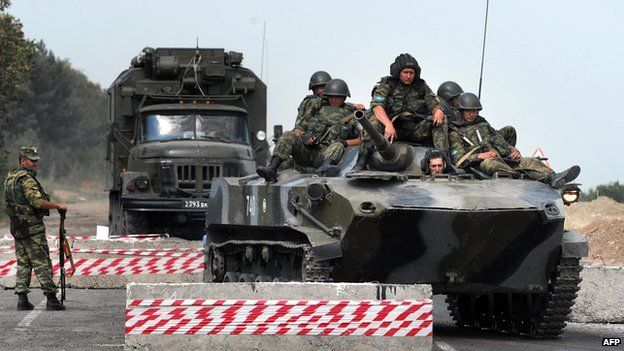Lithuania to reintroduce conscription over security concerns
- Published

Lithuania is to reintroduce conscription over concerns about "the current geopolitical environment" in the Baltic states, President Dalia Grybauskaite says.
Conscription will be renewed for a five-year-period to "enhance and accelerate army recruitment", she said.
Ms Grybauskaite did not specifically refer to the situation in Ukraine, but neighbouring states have expressed worries about Russian aggression.
Parliament must still approve the plan.
Lithuania abolished conscription in 2008, but the new rules would see it reinstated for men aged 19-26, with exemptions for certain categories, such as university students and single fathers.
Up to 3,500 men would be recruited each year.
Latvia's defence minister has also suggested strengthening his country's military, by increasing army numbers to 7,000 men. However, there are no plans to introduce compulsory service.
Analysis: Bridget Kendall, BBC Diplomatic Correspondent
It was Russia's annexation of Crimea last year and President Putin's warning that he reserved the right to protect Russian speakers wherever they were which first raised the alarm in the three small Baltic republics.
In response Nato announced plans for a new rapid reaction force in the region. Now Lithuania says it will bring back compulsory national service starting this September.
It fears that unrest could be stirred up among its tiny minority Russian population.
An even greater worry is that it sits next to Kaliningrad, an enclave cut off from the rest of Russia but bristling with troops and armaments.
Lithuania's top general admitted there was not yet a military threat. But its foreign minister has voiced the fear that "we could be next" if tensions with Russia continued to deepen.
Lithuania was formerly a part of the Soviet Union, along with Latvia and Estonia, but sought to join Nato and the EU upon independence in 1991.
Its proximity to the Russian enclave of Kaliningrad, has lead to fears about possible interference from Russia.
Russia carried out a military drill there in December that featured 9,000 soldiers and more than 55 naval vessels.
That is one of a number of incidents that have led to the deterioration of relationships between Moscow and its neighbours.
Last September Estonian security official Eston Kohver was detained by Russia at the border on accusations of spying. There was a dispute over whether he had been captured on Russian or Estonian soil.
The foreign ministry in Tallinn called it "a very disturbing incident", which lead to a rift between the two countries.
Military conscription in Europe
- Russia - All male citizens aged 18-27 must enrol for a 12-month draft of military service
- Ukraine - Conscription was reinstated in 2014 in response to escalating violence in the east of the country
- Estonia - Compulsory military service for eight or 11 months from the age of 18
- Austria - Voted to retain compulsory military service in 2013. Men must serve six months in the army or nine months in civilian service when they reach 18
- Greece - Males aged 19 to 45 are required by law to perform military service for nine months
- Turkey - Military service is mandatory for all men over the age of 20. They must serve between six and 15 months
- Denmark - Conscripts serve an initial training period that varies from four to 12 months from the age of 18
- Norway - Men aged 19 to 44 must serve in the armed forces for 19 months. Women born from 1997 onwards, will also be conscripted from the summer of 2016
- Finland - Men are called up at 18 but an increasing number are opting for alternative civilian service
- Germany - Compulsory military service was suspended in July 2011, but it remains in the country's constitution
Some analysts have warned that Russia could extend its actions in Ukraine and breed instability in Baltic states, whether through Russian-speaking minorities, energy policy or cyber warfare.
Poland, Ukraine and Lithuania agreed to set up joint military unit of several thousand soldiers in September 2014.
Officials said they planned to make the unit fully operational within 24 months so it could take part in peacekeeping missions or form the basis of a Nato battle group if one was needed in the future.
- Published2 December 2022
- Published18 February 2015
- Published6 February 2015
- Published19 September 2014